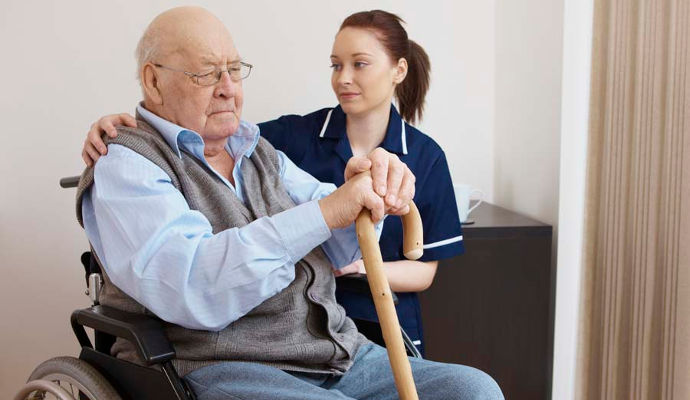If you’re a caregiver for a senior, you know it can be challenging. But don’t worry, you’re not alone! Here are some tips to help make your job a bit easier. First, make sure the senior has plenty of activities to keep them busy.
This will help prevent them from feeling bored or restless. Second, make sure their living environment is as comfortable as possible. Third, eat healthy and exercise regularly yourself so you can stay energized and healthy.
Finally, stay positive and patient! Remember that the elderly often have difficulty with mobility and memory, so don’t get frustrated if they forget things or take a long time to do something. With these tips, you can make caring for a senior a little less daunting.

1. Learn to identify signs of dementia. Some common symptoms of dementia are confusion, agitation, anxiety, restlessness, depression, changes in mood or behavior and memory loss.
2. Try to keep the senior’s living environment as comfortable as possible. For instance, ensure they have enough lighting in their home so they do not trip over things at night.
3. Make sure to eat healthy and exercise regularly yourself so you can stay energized and healthy. This is especially important if you’re caring for an elderly parent too!
4. If your senior loves gardening, encourage them to start a garden in their backyard! They’ll love getting fresh air while socializing with friends or neighbors who stop by to help out or give advice on which plants grow best in certain conditions (e.g. full sun, partial shade, etc.).
5. Stay positive and patient! Remember that the elderly often have difficulty with mobility and memory, so don’t get frustrated if they forget things or take a long time to do something. With patience, you can make caring for a senior much easier!
6. Know what to do if the senior falls and is unresponsive. If you notice they have been sitting or lying in the same position for a long time, shake them and ask if they are alright.
Try to get them to respond by asking questions (“What is your name?”, “What day/month/year is it?”, etc.). If you’re unable to get a response from them after several attempts, call 911 immediately.
7. Know what not to do if the senior falls and is unresponsive. Calling their names repeatedly or shaking them roughly will not help! You should also avoid trying to pick up an unresponsive senior yourself as this can make injuries worse, do more harm than good, and could even lead to broken bones.
8. Set reminders on your phone of when medicines need to be taken, appointments need to be made, or when the senior needs to eat. This will help you stay organized and less stressed.

9. Get involved with a support group for caregivers. This is a great way to share your experiences and advice with others who are in a similar situation as you. You can also find out about helpful resources and programs in your area.
10. Take breaks! If you’re feeling overwhelmed, take some time for yourself. Go for a walk, watch your favorite movie, or just relax in a quiet room. Knowing you have some time to yourself will help rejuvenate you so you can continue caring for the senior.
11. Educate yourself on how to handle a seizure in a senior. If it’s necessary to wake the senior up, do so gently. Gently shake them and call their name until they respond. When the seizure is over, help them safely return to a laying position if they are standing or sitting upright.
12. Pick up all loose items in the home, especially small objects like coins or jewelry, that could cause trips or falls if left out.
13. Make sure furniture (especially chairs) cannot be pulled into stairs by positioning them flush against wall or placing a chair under front legs of furniture.
14. Replace handheld showerheads with mounted models for seniors who still enjoy taking showers; also install non-slip rubber strips or decals on floor of tub/shower for safety .
15. If possible, move the senior’s bed to the ground floor of their home if they are having difficulty with stairs.
16. Assist the senior in choosing clothing that is easy to put on and take off (e.g. pants with elastic waistbands, shirts with buttons instead of zippers, etc.).
17. Take them out for walks and social activities as often as possible to keep them mentally and physically stimulated.
18. If the senior has a pet, make sure they are taken care of and well-fed while you’re caring for the senior. This can provide some relief for you and give the pet some much-needed attention!
19. Make a list of emergency numbers (including 911) and keep it near the phone or in a convenient spot. This will help you if there is an emergency and you need to get help quickly.
20. Ask the senior’s doctor if they can provide any resources or tips on how to care for them. They may have specific instructions on things like wound care, administering medication, or helping with mobility.
21. Take inventory of all the supplies you will need to care for the senior and make a shopping list so that you’re prepared when needed (e.g. medical supplies, personal hygiene products, snacks, etc.).
22. Don’t be afraid to ask for help! Friends, family members, neighbors, or church groups may be willing to pitch in and give you a break every once in a while.
23. Understand when it is time for hospice care. Hospice at Home can help you care for a terminally ill family member in the comfort of their own home.
24. Keep your sense of humor! If things get too stressful, take a minute to watch a funny video or tell a joke with the senior. Laughter is good medicine!
25. Find out about different types of memory loss and what they mean. This will help you understand what the senior is experiencing and how to best communicate with them.
26. Take care of yourself, too! It’s important to make sure you’re getting enough rest, eating healthy foods, and exercising regularly. This will help you stay strong so you can continue caring for the senior.
27. Seek professional help if you are feeling overwhelmed or stressed out. There are many resources available to caregivers, and it’s important to get the support you need.
28. Document everything! This includes daily routines, medications taken, meals eaten, conversations had, etc. This information can be helpful if there are any changes in the senior’s condition down the road.
29. If possible, attend a caregiver support group where you can share experiences and learn valuable information.
30. Call for help if the senior’s condition suddenly worsens (e.g. increased confusion, bleeding that won’t stop, etc.). If needed, take them to their doctor or the emergency room right away.
31. Help seniors who are losing mobility by cleaning up clutter in their home which could make it difficult to maneuver around; also consider adding handrails in high traffic areas like hallways and staircases .
32. Have patience! Caregiving is a long-term commitment; it isn’t always easy but your efforts will really make a difference in your loved one’s life!

33. Try not to take things personally talking with the senior about medical conditions, changes in behavior, etc. can be difficult but it’s important that they are able to express what they are feeling.
34. Identify several “safe zones” which are high traffic areas of the house where the senior can escape if they need a break from too much activity (e.g. den, living room sofa, etc.).
35. Keep their normal routine as much as possible! Sticking to your regular schedule will help reduce confusion and agitation for you and the senior .
36. Be prepared for emotional outbursts caused by memory loss or medical conditions; stay calm and remember that this is not their fault .
37. Encourage physical activity by walking with them around the neighborhood or taking them on errands; this will help keep them healthy and mobile.
38. Assist with simple tasks like bathing, dressing, and grooming to make them feel more independent.
39. Make time for yourself! Take a break every day to do something that you enjoy, even if it’s just for a few minutes.
40. Celebrate the small accomplishments! If the senior manages to take a shower on their own or remembers your birthday, celebrate it! These moments are cause for celebration.
Conclusion paragraph
If you’re a caregiver for an elderly person, it can be difficult. But don’t worry! Here are some tips to help make your job easier and more rewarding. First, provide plenty of activities to keep them busy so they don’t get bored or restless.
Second, create the most comfortable living environment possible by making sure their home is clean and clutter-free. Third, stay energized and healthy yourself by eating well and exercising regularly.
Finally, remember that the senior will appreciate all you do for them even if things seem tough at times because caring for someone else sometimes means doing what’s best not only for the other person but also yourself as well!

